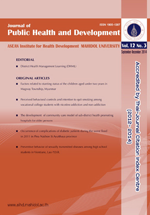Determinants of cevical cancer screening among migrants in northern district of Yangon, Myanmar
Main Article Content
Abstract
A cross-sectional study was designed to identify factors affecting cervical cancer screening of migrant women aged 30-49 years in Hlaing Thar Yar Township. Multistage cluster sampling was used to randomly select 666 respondents. They were face to face interviewed by six trained interviewers after obtaining informed consent during April and May 2015. Chi–square tests and multiple logistic regression were used to examine associations between independent variables and cervical cancer screening.
The prevalence of cervical cancer screening among migrants in the previous 3 year was 19.1%. Cervical cancer screening was found to be significantly associated with marital status, family history of cervical cancer, knowledge, affordability for extra pay to get screening, providers’ rapid response, waiting time, social support, family support, material support and perception regarding perceived threats, benefits, barriers and cues to actions. After adjusting for age, family history of cervical cancer, and other factors in the model, perceived barriers (Adj OR = 2.42, 95% CI = 1. 45-4.04) and knowledge levels (AdjOR = 2.21, 95% CI = 1.40—3.47) remained significant predictors of cervical cancerscreening adherence. Migrants with high level of knowledge about cervical cancer screening were 2.21 times more likely to have cervical cancer screening than those with poor level.
The findings of this study suggested that promoting free of charge, providing health education programs to increase knowledge and good perception about cervical cancer screening services among migrants to increase the prevalence of screening.






